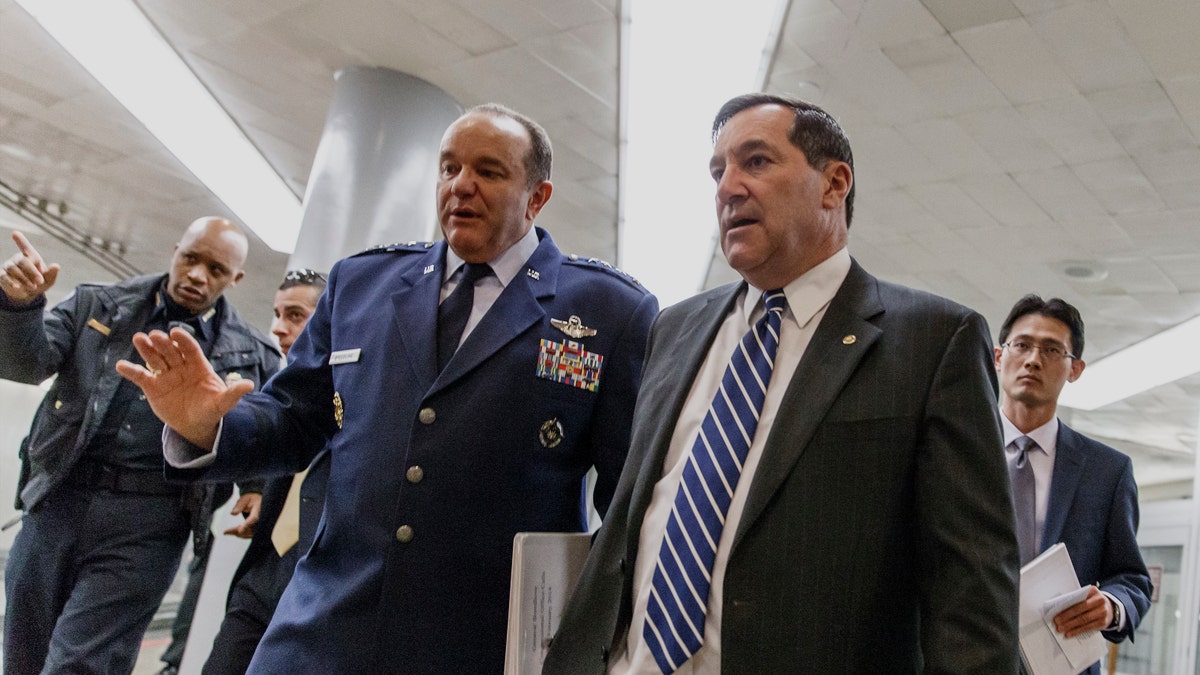
Feb. 12, 2014: Air Force Gen. Philip M. Breedlove, Supreme Allied Commander, Europe, walking with Sen. Joe Donnelly, D-Ind. on Capitol Hill in Washington. (ap)
Congress voted Wednesday to restore full cost-of-living pension increases for younger military retirees, completing a bipartisan capitulation to veterans groups that rose up against a modest cut when it was enacted less than two months ago.
The Senate voted 95-3 for the measure, one day after the House approved it, 326-90. The White House said President Barack Obama would sign it.
The overwhelming support the bill enjoyed, including backing by many prominent deficit hawks, reflected the clout that veterans groups enjoy, particularly in an election year.
"Congress has acknowledged we ....must be faithful to the promises made when they enlisted," Sen. James Inhofe, R-Okla., said in a statement after the vote. "Our men and women in uniform deserve the best."
The bill's existence also underscored the difficulty that lawmakers face when they try to restrain government benefit programs, which have largely escaped the impact of trillions of dollars in deficit cuts over the last three years.
"Year after year members of Congress simply refuse to stick by the budget discipline that we said we'd stick to. Exhibit one is before us today," said Sen. Jeff Flake, an Arizona Republican who cast one of the three votes against the measure's passage. Sens. Tom Carper, D-Del., and Dan Coats, R-Ind., also opposed the bill.
Under legislation that passed in December, annual cost of living increases for veterans age 62 and younger would have been held to 1 percentage point below the rate of inflation. The change would have begun in 2015.
Pentagon officials have said that reducing their personnel expenses is a top priority in view of budget cutbacks, and a commission is expected to make recommendations later this year on reining in costs.
Yet even lawmakers most familiar with the Pentagon's budget said the cut enacted in December was a mistake.
"It was wrong to do it the way it was done. ...There wasn't any hearing or anything," said Sen. John McCain, of the agreement reached by Rep. Paul Ryan, R-Wis., and Sen. Patty Murray, D-Wash. "They just decided it was a way to save money. That's not the proper way to do it."
The savings to the government from the reduction was pegged at $7 billion over a decade, but critics said it would cost individual veterans tens of thousands of dollars over their lifetime.
The pensions go to veterans who retire after 20 years of service, regardless of their age. According to the Pentagon, nearly 2 million retirees are currently eligible, about 840,000 of them under age 62. For a sergeant first class who leaves the service at age 42 after two decades in uniform, the bill passed in December would have meant an estimated $72,000 in reduced pension payments from the government.
The bill headed to the White House would only apply to those already in the service. Newcomers to the military would still have their cost of living increases held below the rate of inflation when they begin retiring, in two decades or more.
In agreeing to approve the House-passed bill, Senate Democrats backed off their insistence that the cost of restoring the full pension be allowed to add to the government's deficit. Instead, the measure offsets the price tag by extending previously-approved cuts elsewhere in the budget for another year, until 2024.
Approval of the House-passed measure would also deny Democrats who are in difficult re-election races this year of bragging rights for the repeal, since their own bill on the subject was jettisoned.
In fact, Republicans in both houses led the charge for repealing the cut, and several of them voted against last year's budget measure because of it.
Several critics said it was particularly unfair to apply a cut to military pensions when other benefit programs were largely going unscathed. "It is the wrong priority for America to single out those who have taken the bullets for us," Sen. Kelly Ayotte, R-N.H., said Monday in remarks on the Senate floor.




